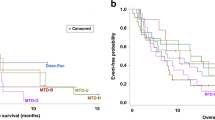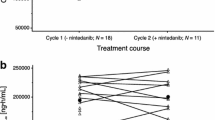Summary
Objective: Methylthioadenosine phosphorylase (MTAP)–deficient tumors are dependent on the de novo purine synthesis pathway. These cancers are potential targets for selective chemotherapy with inhibitors of de novo adenine synthesis such as L-alanosine [L-2-amino-3-(N-hydroxy-N-nitrosamino) propionic acid]. This phase II study was designed to evaluate the efficacy and safety of L-alanosine in patients with MTAP-deficient solid tumors. Methods: Patients with mesothelioma, non–small cell lung cancer (NSCLC), soft tissue sarcoma, osteosarcoma, or pancreatic cancer whose tumors were MTAP deficient by immunohistochemistry were eligible. Patients received L-alanosine at a starting dose of 80 mg/m2 by continuous intravenous infusion daily for 5 days every 21 days. Computed tomography scans or magnetic resonance imaging were performed every 3 cycles. Results: 65 patients (16 mesothelioma, 13 NSCLC, 15 soft tissue sarcoma, 7 osteosarcoma, 14 pancreatic cancer) were enrolled at 19 centers; 55 were evaluable for response. There were no objective responses; 24% had s disease, including 2 patients with mesothelioma who had prolonged stable disease lasting 7.5 and 15.2 months, respectively. Grade 3/4 toxicities included mucositis 11%, fatigue 6%, nausea 3%, and renal failure 1.5%. Conclusion: At this dose and schedule, L-alanosine was ineffective in patients with advanced MTAP-deficient tumors.

Similar content being viewed by others
References
Powell EL, Leoni LM, Canto MI et al (2005) Concordant loss of MTAP and p16/CDKN2A expression in gastroesophageal carcinogenesis: evidence of homozygous deletion in esophageal noninvasive precursor lesions and therapeutic implications. Am J Surg Pathol 29:1497–1504, doi:10.1097/01.pas.0000170349.47680.e8
Illei PB, Rusch VW, Zakowski MF et al (2003) Homozygous deletion of CDKN2A and codeletion of the methylthioadenosine phosphorylase gene in the majority of pleural mesotheliomas. Clin Cancer Res 9:2108–2113
M’soka TJ, Nishioka J, Taga A et al (2000) Detection of methylthioadenosine phosphorylase (MTAP) and p16 gene deletion in T cell acute lymphoblastic leukemia by real-time quantitative PCR assay. Leukemia 14:935–940, doi:10.1038/sj.leu.2401771
Schmid M, Malicki D, Nobori T et al (1998) Homozygous deletions of methylthioadenosine phosphorylase (MTAP) are more frequent than p16INK4A (CDKN2) homozygous deletions in primary non-small cell lung cancers (NSCLC). Oncogene 17:2669–2675, doi:10.1038/sj.onc.1202205
Hori Y, Hori H, Yamada Y et al (1998) The methylthioadenosine phosphorylase gene is frequently co-deleted with the p16INK4a gene in acute type adult T-cell leukemia. Int J Cancer 75:51–56, doi:10.1002/(SICI)1097-0215(19980105)75:1<51::AID-IJC9>3.0.CO;2-0
Nobori T, Karras JG, Della RF et al (1991) Absence of methylthioadenosine phosphorylase in human gliomas. Cancer Res 51:3193–3197
Behrmann I, Wallner S, Komyod W et al (2003) Characterization of methylthioadenosin phosphorylase (MTAP) expression in malignant melanoma. Am J Pathol 163:683–690
Garcia-Castellano JM, Villanueva A, Healey JH et al (2002) Methylthioadenosine phosphorylase gene deletions are common in osteosarcoma. Clin Cancer Res 8:782–787
Li W, Su D, Mizobuchi H et al (2004) Status of methylthioadenosine phosphorylase and its impact on cellular response to L-alanosine and methylmercaptopurine riboside in human soft tissue sarcoma cells. Oncol Res 14:373–379
Hustinx SR, Leoni LM, Yeo CJ et al (2005) Concordant loss of MTAP and p16/CDKN2A expression in pancreatic intraepithelial neoplasia: evidence of homozygous deletion in a noninvasive precursor lesion. Mod Pathol 18:959–963, doi:10.1038/modpathol.3800377
Hustinx SR, Hruban RH, Leoni LM et al (2005) Homozygous deletion of the MTAP gene in invasive adenocarcinoma of the pancreas and in periampullary cancer: a potential new target for therapy. Cancer Biol Ther 4:83–86
Murthy YK, Thiemann JE, Coronelli C et al (1966) Alanosine, a new antiviral and antitumour agent isolated from a Streptomyces. Nature 211:1198–1199, doi:10.1038/2111198a0
Batova A, Diccianni MB, Omura-Minamisawa M et al (1999) Use of alanosine as a methylthioadenosine phosphorylase-selective therapy for T-cell acute lymphoblastic leukemia in vitro. Cancer Res 59:1492–1497
Harasawa H, Yamada Y, Kudoh M et al (2002) Chemotherapy targeting methylthioadenosine phosphorylase (MTAP) deficiency in adult T cell leukemia (ATL). Leukemia 16:1799–1807, doi:10.1038/sj.leu.2402570
Efferth T, Miyachi H, Drexler HG et al (2002) Methylthioadenosine phosphorylase as target for chemoselective treatment of T-cell acute lymphoblastic leukemic cells. Blood Cells Mol Dis 28:47–56, doi:10.1006/bcmd.2002.0483
Rubin J, Hineman V, Moertel CG et al (1983) A phase II study of alanosine in advanced large bowel carcinoma. Am J Clin Oncol 6:191–193
Creagan ET, Schutt AJ, Ingle JN et al (1983) Phase II clinical trial of L-alanosine in advanced upper aerodigestive cancer. Cancer Treat Rep 67:1047
Creagan ET, Long HJ, Ahmann DL et al (1984) Phase II evaluation of L-alanosine (NSC-153353) for patients with disseminated malignant melanoma. Am J Clin Oncol 7:543–544, doi:10.1097/00000421-198410000-00030
Elson PJ, Kvols LK, Vogl SE et al (1988) Phase II trials of 5-day vinblastine infusion (NSC 49842), L-alanosine (NSC 153353), acivicin (NSC 163501), and aminothiadiazole (NSC 4728) in patients with recurrent or metastatic renal cell carcinoma. Invest New Drugs 6:97–103, doi:10.1007/BF00195367
Von Hoff DD, Green SJ, Neidhart JA et al (1991) Phase II study of L-alanosine (NSC 153353) in patients with advanced breast cancer. A Southwest Oncology Group study. Invest New Drugs 9:87–88
Yu J (2001) Alanosine (UCSD). Curr Opin Investig Drugs 2:1623–1630
McCarty KS Jr, Miller LS, Cox EB et al (1985) Estrogen receptor analyses. Correlation of biochemical and immunohistochemical methods using monoclonal antireceptor antibodies. Arch Pathol Lab Med 109:716–721
Simon R (1989) Optimal two-stage designs for phase II clinical trials. Control Clin Trials 10:1–10, doi:10.1016/0197–2456(89)90015–9
Dosik GM, Stewart D, Valdivieso M et al (1982) Phase I study of L-alanosine using a daily x 3 schedule. Cancer Treat Rep 66:73–76
Goldsmith MA, Ohnuma T, Spigelman M et al (1983) Phase I study of L-alanosine (NSC 15353). Cancer 51:378–380, doi:10.1002/1097-0142(19830201)51:3<378::AID-CNCR2820510303>3.0.CO;2-I
Batova A, Cottam H, Yu J et al (2006) EFA (9-beta-D-erythrofuranosyladenine) is an effective salvage agent for methylthioadenosine phosphorylase-selective therapy of T-cell acute lymphoblastic leukemia with L-alanosine. Blood 107:898–903, doi:10.1182/blood-2005-06-2430
Yu J, Batova A, Shao L et al (1997) Presence of methylthioadenosine phosphorylase (MTAP) in hematopoietic stem/progenitor cells: its therapeutic implication for MTAP (-) malignancies. Clin Cancer Res 3:433–438
Acknowledgments
Research support was provided by Salmedix, Inc.
The authors thank Michael Lobell, MD, and Jennifer Oliver, MD, for assistance with data interpretation and editorial guidance. We also acknowledge the literature research and editorial contributions of Bridget O’Keeffe, PhD, in the development of this manuscript.
Author information
Authors and Affiliations
Corresponding author
Rights and permissions
About this article
Cite this article
Kindler, H.L., Burris, H.A., Sandler, A.B. et al. A phase II multicenter study of L-alanosine, a potent inhibitor of adenine biosynthesis, in patients with MTAP-deficient cancer. Invest New Drugs 27, 75–81 (2009). https://doi.org/10.1007/s10637-008-9160-1
Received:
Accepted:
Published:
Issue Date:
DOI: https://doi.org/10.1007/s10637-008-9160-1




